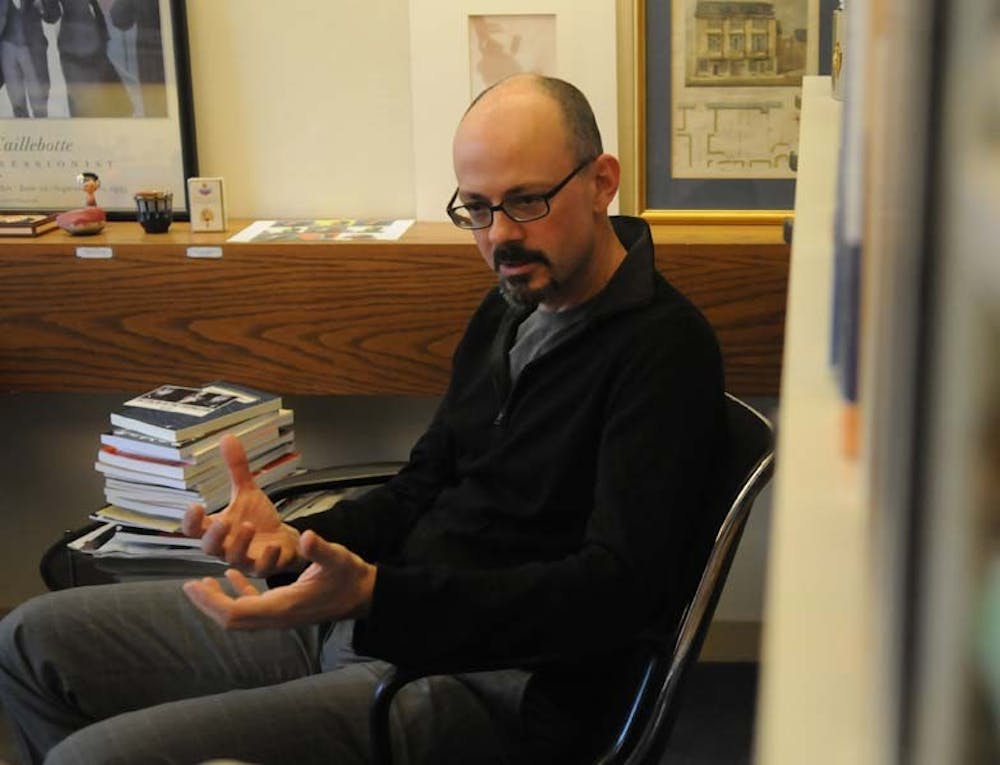
When Slavic languages and literature professor Kevin Platt left the U.S. for Latvia and Russia in June 2011, he thought he was leaving during an exciting time here for a “stagnant place where nothing ever happens.”
Instead, he witnessed a dynamic moment in contemporary Russian politics.
On his sabbatical, Platt experienced first hand the controversy surrounding the 2011 Russian presidential elections, marred with allegations of voter fraud.
Every semester, roughly 35 professors from the School of Arts and Sciences are on sabbatical, according to Dean of SAS Rebecca Bushnell. The sabbaticals vary in length, ranging from one semester to a year.
Sabbaticals are generally only given to tenured professors. They are often a time for professors to conduct research with access to materials they cannot necessarily get at Penn.
Platt, who is the current graduate chair of the Comparative Literature Program and topic director of the Penn Humanities Forum this year, left for his sabbatical to research Russian cultural history in June 2011.
In Europe, he worked on several projects at once while keeping an eye on the Russian opposition movement that followed Vladimir Putin’s election. He also became involved with the media as a result of this interest.
“For me, it’s necessary to do different things at once,” Platt said. “I like to switch gears between the contemporary and history, and also to study the relationships between different periods.”
One of these research projects is about Russian culture in former Soviet areas like Latvia, where his wife is from. A substantial percentage of Latvians identify as Russian, while others do not, according to Platt. He is studying the culture of this area and the question of what it means to be Russian and the politics of ethnicity.
The other project Platt is working on is about the history of writing about history. During his time in Russia, he spent a lot of time at the Museum of Political History in St. Petersburg, looking through archives and helping with a new exhibit on 20th century political history.
He also taught a course at the European University in St. Petersburg on history and memory.
But his focus on history did not distract him from the present, when he became involved with Russian protests and media outlets after their presidential election.
The election in December 2011 became controversial when, after Vladimir Putin won, people claimed there were instances of election fraud.
The first protests began that December with around 6,000 people then quickly grew to large demonstrations with over 100,000 participants.
Platt and his wife went to some of these protests and talked to the people in the opposition movement.
“It was exciting for us to be there and see such a sudden transformation,” he said.
Protests this big were impossible to imagine just a year before, he added.
In January of this year, Platt started to follow the punk-rock group Pussy Riot’s protests. The group became internationally known after being arrested for protesting in a church in Moscow. Their free speech demonstration and subsequent arrest became an international cause adopted by many famous musicians including Madonna, Peter Gabriel and Sting.
Platt was one of the group’s earlier followers and started posting about them on Facebook in January. At first, only people invested in the opposition movement knew about Pussy Riot, he said.
Because of his early involvement, The Pacific Standard did an in-depth interview with Platt about Pussy Riot and Russian politics in August.
Platt gives the members of Pussy Riot a lot of credit for their protest. He said that they were able to attach many causes — like LGBT issues, ecological protest, free speech, feminism and oppressive church intuitions — so that many across the world identified with them.
“People around the world think Pussy Riot is standing up for whatever you hold dear,” Platt said.
In addition to his Pacific Standard interview, Platt made another media appearance with a piece, published in the Wall Street Journal, that he wrote with his wife about a Russian internet TV channel.
The couple went to the set of TV Rain to profile the internet television channel and Misha Kozyrev, one of TV Rain’s leading personalities. In the article, Platt calls Rain “the only outlet for free political expression in Russian television.”
“The piece fit really well [with both of our interests] since we’re both fascinated by contemporary Russian politics, [my wife Karina] even more than I am,” Platt said. “For me it was fascinating, but at a distance. Karina was emotionally invested and agitated by what was going on.”
For Platt, his sabbatical was not a year off, but it was still a “fun and exciting” year.
“Here, there’s always a certain number of hours per week where I have to be somewhere. It’s hard to find eight hours in a row to go to the library when you’re teaching,” Platt said. “I was busy on leave too, but it was great to just have some uninterrupted time for research.”
The Daily Pennsylvanian is an independent, student-run newspaper. Please consider making a donation to support the coverage that shapes the University. Your generosity ensures a future of strong journalism at Penn.
DonatePlease note All comments are eligible for publication in The Daily Pennsylvanian.








